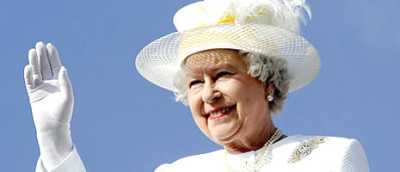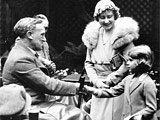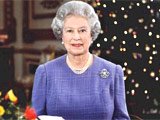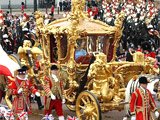
Queen Elizabeth II turns 80 today with her reputation intact, abdication firmly ruled out, and her eldest son Charles facing yet another decade as heir in waiting. Despite a tumultuous decade of scandals, divorce and tragedy for Britain's most famous dysfunctional family, Elizabeth's popularity has survived and even revived in recent years. The latest polls suggest just one in 10 of her subjects want to see the Queen step down, while palace courtiers dismiss rumours of Charles, 57, acting as a 'shadow king'.
Elizabeth meanwhile, has steadily refused to allow the Republican voice of dissent to dent her steely resolve, insisting the role is "a job for life." She is also firmly committed to the Commonwealth of former British colonies and has travelled more widely than any previous monarch to promote friendly ties with them. Crowned nearly 53 years ago, Elizabeth has held the House of Windsor together through some of its most challenging times -- including several calls to dissolve the largely ceremonial institution she represents.
Over the course of her reign, she has brought the British monarchy into the modern age, allowing the public more access to her family that any monarch before her.
At the same time, the Queen has struggled against tabloid scandals to present her family as, ultimately, just average.
Known to favour simplicity in palace life, the Queen appears to take a serious and informed interest in government business, aside from her traditional and ceremonial duties.
Privately she is a keen horsewoman and keeps racehorses. She frequently attends races and periodically visits the stud farms of Kentucky.
Her financial and property holdings have also made her one of the richest women in the world.

Queen Elizabeth II, then Princess Elizabeth, is introduced by her mother Elizabeth, the Duchess of York, to disabled soldiers at an exhibition of their work in London, in this May 16, 1933 photo. (AP Photo) The unassuming Queen Born in London on April 21, 1926, Elizabeth Alexandra Mary Windsor was the first child of Albert, Duke of York, and his wife, Lady Elizabeth Bowes-Lyon -- later to become King George VI and Queen Elizabeth, The Queen Mother. Elizabeth was never expected to ascend to the throne. But when her uncle King Edward VIII abdicated in 1936 to marry American divorcee Wallis Simpson, her father George succeeded to the throne and Elizabeth's fate was sealed; she was now the heir presumptive and would follow in his place.
During the Second World War, Elizabeth and her sister Princess Margaret spent much of their time safely away from the London Blitz -- living mostly at Balmoral Castle in Scotland and at Windsor Castle. Then in 1947, when the Princess was 21, she married her 4th cousin -- the dashing Lieut. Philip Mountbatten, great-great grandson of Queen Victoria. The wedding took place in Westminster Abbey on Nov. 20, 1947 and on the eve of the wedding the king conferred various titles on Philip, including Duke of Edinburgh.
Elizabeth began a family almost as soon as she married, bearing two children -- Charles, born in 1948, and Anne, born in 1950. However, the family's carefree life proved to be short-lived. During the summer of 1951, the health of King George VI entered into a serious decline. He died of lung cancer in February 1952 -- sending Elizabeth to the throne and abruptly ending Philip's naval career. The young and beautiful Elizabeth may have been nervous about her new role, but the British public was delighted with such a glamorous distraction from the post-war doldrums. In 1953, the year she ascended, Elizabeth was named Time magazine's "Woman of the Year". Her coronation at Westminster Abbey on June 2 was broadcast on radio around the world and, at the Queen's insistence, on television for the first time.
The Royal Family's public life had entered the 20th century. From then on, every major royal event has been broadcast on TV stations around the world.
 With another war in Europe in the offing, King George Vl and Queen Elizabeth came to Canada to unveil a monument in Ottawa commemorating Canada's First World War dead. (CP Photo)
With another war in Europe in the offing, King George Vl and Queen Elizabeth came to Canada to unveil a monument in Ottawa commemorating Canada's First World War dead. (CP Photo)
Responsibilities As the Queen, Elizabeth has always taken her responsibilities seriously. In November 1953, she and the Duke of Edinburgh completed a six-month tour of the Commonwealth. And in 1957, after state visits to various European nations, they visited Canada and the United States. During her Silver Jubilee in 1977, she presided at a London banquet attended by the leaders of the 36 members of the Commonwealth, travelled all over Britain and Northern Ireland, and toured overseas in the South Pacific and Australia, Canada, and the Caribbean.
Elizabeth continues today to maintain a busy schedule, becoming the most widely travelled head of state in the world. Yet while many adore her, others have publicly questioned her role, wondering whether a place still exists for a publicly-funded monarchy in these modern and cynical times. Elizabeth, ever aware of the monarchy's public image, responded in 1993 by announcing she would begin paying income and capital gains taxes on a voluntary basis, just like any other citizen.
Her role was even formally questioned in Australia in 1999 when the country held a national referendum on whether she should remain as the country's Head of State.
But after months of debate and a vote, Australians finally decided she should stay.
 Queen Elizabeth II records her traditional Christmas television and radio broadcast to the Commonwealth at Windsor castle near London on Dec. 12, 1997. (AP Photo/John Stillwell)
Queen Elizabeth II records her traditional Christmas television and radio broadcast to the Commonwealth at Windsor castle near London on Dec. 12, 1997. (AP Photo/John Stillwell)
The television age Elizabeth has always embraced the medium of television as a way to connect with her public and to show the world that her family is just like any other. When she had her third child Andrew in 1960 and then Edward in 1964, it was television that brought the images of the baby princes into homes around the world. Yet with the television age came an increasingly invasive media that has probed relentlessly into the personal lives of the Queen and her family.
And though Elizabeth has worked to maintain the monarchy's image of restraint and dignity, her own spotless image was overshadowed in recent years by tabloid reports of the numerous scandals of those close to her. Much has been written about the failed marriages of three of her four children. But the Queen has offered little public reaction to any of these events -- except in 1992, the year she called her 'annus horribilis'. In that one year, Princess Anne divorced, Prince Andrew and Sarah Ferguson separated, there was a major fire at Windsor Castle and, perhaps most damaging to the family's image, the Andrew Morton book was published about Princess Diana.
Yet while Elizabeth's stiff-upper-lip demeanour has worked for most of her reign, the approach backfired after the death of Princess Diana in a Paris car crash in 1997. The Queen faced heavy criticism for the Palace's silence and apparent apathy. The British public, and much of the world, demanded reaction from the institution that shut Diana out and the monarchy's popularity plummeted. The Queen finally responded by offering her first live public address to Britain's people in 38 years, broadcast of course, on national television. Elizabeth spoke with visible emotion as she reflected on the life and death of the Princess.
The public's anger soon dissipated and the Queen was praised for achieving yet another PR coup.
In 2002, she marked her Golden Jubilee, celebrating 50 years on the throne.
Celebration plans had been in the works for years, with tours planned for 23 Commonwealth countries and all the counties of Britain.
But the year began under a cloud. In early February, Elizabeth's sister Princess Margaret died at the age of 71 after suffering a stroke.
Then, just seven weeks later, the 101-year-old Queen Mother died.
After an official 10-day mourning period, the Queen returned to the festivities, celebrating her birthday in April with a parade through the streets of London.
 Queen Elizabeth II, accompanied by her husband Prince Philip, rides in the Gold State Coach from Buckingham Palace to St Paul's Cathedral for a service to celebrate her Golden Jubilee in London. (AP / John Giles)
Queen Elizabeth II, accompanied by her husband Prince Philip, rides in the Gold State Coach from Buckingham Palace to St Paul's Cathedral for a service to celebrate her Golden Jubilee in London. (AP / John Giles)
Golden Jubilee Her coronation date was marked in June with four days of celebrations, capped off by a huge rock concert for 12,000 invited guests outside Buckingham Palace. And in April 2005, the tension between Elizabeth and her eldest son over his tortuous love life was finally eased when Charles married Camilla Parker-Bowles after a 35-year love affair. Known for her dry sense of humour and skills as a mimic, Elizabeth was recently described as "fit as a flea and totally in command of her senses," by royal biographer Penny Junor. "She enjoys it and this is what she signed up for."
*By Sarah Challands, CTV NEWS
No comments:
Post a Comment